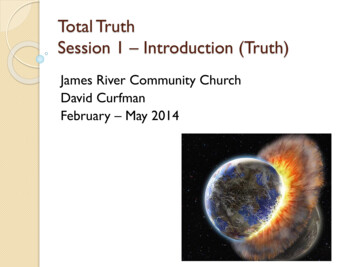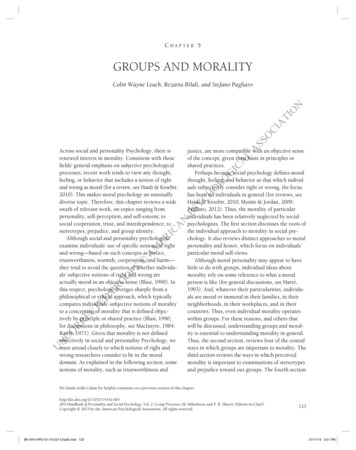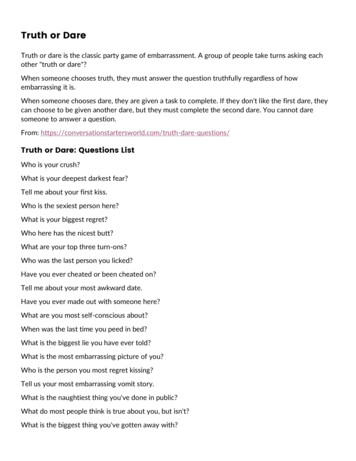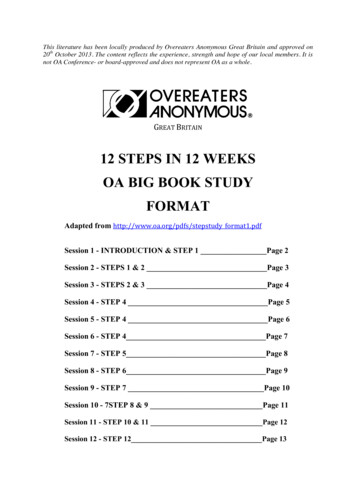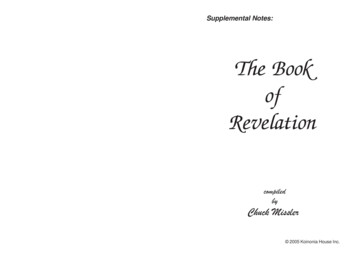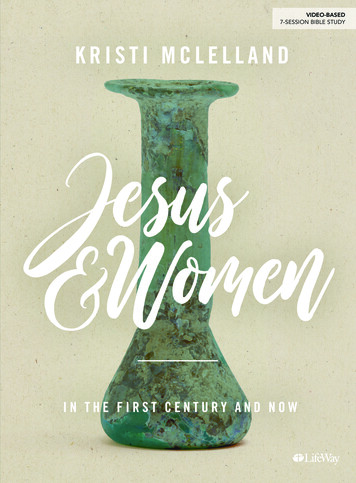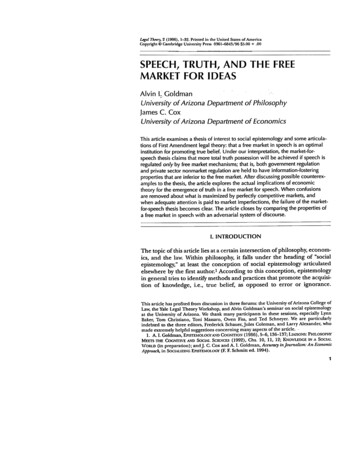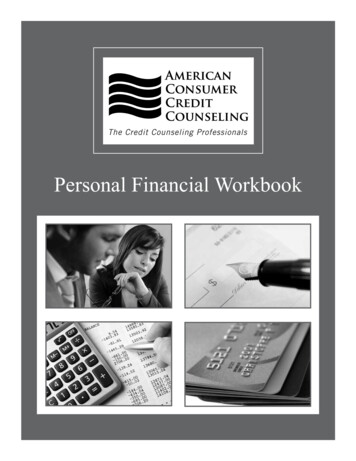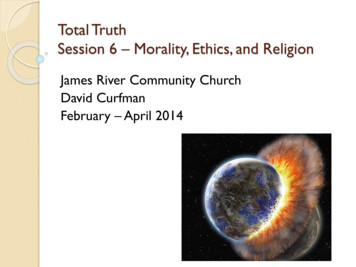
Transcription
Total TruthSession 6 – Morality, Ethics, and ReligionJames River Community ChurchDavid CurfmanFebruary – April 2014
Did you look at your workdifferently this week? What’s the difference between work, play,and service? MotivationThe supreme accomplishment is to blur the line betweenwork and play. - Arnold J. Toynbee Next topic – Morality without religion? http://youtu.be/sEQuIDqY6Cc
OutlineIntroduction – Truth2. Two Worlds – Post Modernism3. Other Worldviews4. Ancient Worldviews5. Cultural Mandate - Work6. Morality, Ethics, and Religion7. Privatization of Faith8. The Science of the Common Sense9. Darwin’s of the Mind10. How We Lost our Minds11. When American met Christianity, Guess Who Won?12. What Next? Living it Out1.
What then are our keycomplementary roles in culture?To create, improve and transform culture bydeveloping the social order and natural ordervia our work (Gen 1:28)2. To bring Christ into the lives of people1. Matthew 28: 19 & 20 – “Therefore go and make disciples of allnations, baptizing them in the name of the Father and of theSon and of the Holy Spirit, and teaching them to obeyeverything I have commanded you.”The Great Commission3. To love God with all of your being4. To love your neighbor-
To recap – Do your core valuesalign with the values of your work? Many of us live in two worlds: Private world (family, church, faith expressed) Public world (suppression of faith and truth)How can we be bilingual (i.e., gospelperspective and language of the culture)? How does this affect our sense offulfillment? Only when we’re engaged in creative,constructive work – for the glory of God andthe benefit of others We’re not on an endless vacation
How does the “cultural mandate”affect our view of the culture?Can we appreciate works of art andmusic and culture as products of humancreativity expressing the image of God? Can we respond to sin and error in lightof the standard of scripture? Can we appreciate the beauty, but critiquethe content of a piece of art, music, orculture? So, what is your first response to culture? Celebration of creativity? Condemnation of sin?
How does the “cultural mandate” affectour view of Life?It’s not an abstract, random, or academic process,but intensely providential It points us to the Creator to answer to the cryof the human heart – “Why am I here?” Do you know the Christian Worldview is truth? God’s truth demands a response: A sacred/secular split makes no sense God’s Word becomes a light to all ourpaths I must bring every part of my life underthe Lordship of Jesus – to love Him,glorify Him, and cultivate His creation!
Can you give examples of believerswho transformed the social order? Justinian (483-565) – Byzantine emperor who had hisjurists prepare the Justinian Code, which clearlycondemned abortion and infanticide as illegal. George Mueller (1805-98) – Mueller was an evangelistwho established orphanages in Bristol, England after acholera epidemic. For the next 60 years, he cared formore than 10,000 orphaned and abandoned children. Rev. Martin Luther King, Jr. (1929-1968) – Baptist ministerwho spoke in support of fair and equal treatment forAfrican Americans in the United States during the 1960’s.He was awarded the Nobel Peace Prize in 1964
Can you give examples of believerswho transformed science? Nicolaus Copernicus (1473-1543) – Polish astronomer who proposed theheliocentric model (planets revolving around the sun). Johannes Kepler (1571-1630) – German astronomer and accomplishedscientist who coined the phrase, “Thinking God’s thoughts after him”,identified two key laws of astronomy – the elliptical orbit of planets and thelaw that planets do not move at a uniform speed. Isaac Newton (1642-1727) – English physicist and mathematician whose manyaccomplishments include the discovery of the law of gravity and the inventionof calculus. George Washington Carver (1864-1943) – An African-American chemist (hisparents were slaves) was awarded the Roosevelt Medal in 1939 for hisresearch on peanuts and sweet potatoes. The medal read, in part, “To ascientist humbly seeking the guidance of God ”
Can you give examples of believerswho transformed art? Johann Sebastian Bach (1685-1750) - A dedicated Christian, aprolific composer, wrote sacred music, dedicating his efforts to theglory of God. Michelangelo (1475-1564) – Italian Renaissance artist isremembered for his many biblically inspired works of art, includingthe sculpture of David, his painting of the Sistine Chapel in Romeand “The Last Judgment”. Michelangelo “believed that spiritual valuecould be found in all natural beauty.” George Frederick Handel (1685-1759) – German born composer,wrote the admired oratorio “Messiah” in a matter of weeks. Rembrandt (1606-1669) – Dutch painter was one of the world’sgreatest painters and is known for his many biblical words including“Return of the Prodigal Son”.
Can you give examples of believerswho transformed literature? John Milton (1608-1674) – was a Puritan who penned “Paradise Lost”which recounts the Fall of Man and is considered a masterpiece of epicEnglish literature. Harriet Beecher Stowe (1811-1896) - Stowe’s vivid portrayal of slavery inher classic book “Uncle Tom’s Cabin” later caused Abraham Lincoln toremark, “So this is the little lady who caused the great war”. Aleksandr Solzhenitsyn (1918-2008) – Russian author and historian as wellas recipient of the Nobel Peace Prize in literature, wrote about the Sovietlabor camps (the Gulag) and was later exiled from Russia. J.R.R. Tolkien and C. S. Lewis – Two 20th century English writers whopenned some of the most popular works of fantasy in print; Tolkien “TheLord of the Rings” and Lewis “The Chronicles of Narnia”.
So, What happened to take Godout of our culture? Middle Ages – unified thought Renaissance (new birth) (1450) – Encouraged men to abandon therestraints of the church and to develop modern interests,enthusiasm and ideals. Revival of Learning, an awakening of mindand a thirst after the new knowledge. Result – numerousinvestigations of natural events, in a widespread study of art andliterature Scientific Revolution (1500) – Copernicus, Galileo, Kepler, DaVinci Enlightenment (1700) – Its purpose was to reform society usingreason, challenge ideas grounded in tradition and faith, and advanceknowledge through the scientific method. It promoted scientificthought, skepticism, and intellectual interchange. Science is the solesource of knowledge.
Dualism Rene Decartes (1600’s) – “I think, therefore I am”.Material world is a vastmachine. He separated mind (spirit,mind, emotion, will,thought) and matter (amachine subject to reason,laws, rules)RomanticismHumanities andReligionEnlightenmentScience andReason
What happened to our culture in the 1800’s?(Romanticism or Secular Revolution) In the late 1800’s and early 1900’s therewas drive to “professionalize” all fields Secular approach Scientific Value-freeColleges moved from a “generalProtestant worldview and morality” to a“secular, a-religious, irreligious pursuit andtransmission of knowledge” Affected every area of culture – publicschools, politics, psychology, media
So, What happened to take Godout of Harvard? Motto in 1636 – “Veritas pro Christo et Ecclesia;” (Truth for Christand Church) Motto today – “Veritas” “Rules and Precepts” (1646) – “the main end of life and studies is, toknow God and Jesus Christ which is eternal life the only foundationof all sound knowledge and Learning.” President Charles W. Eliot (1869) – drawing on Unitarian andEmersonian ideals, “The worthy fruit of academic culture is an openmind trained to careful thinking, instructed in the methods ofphilosophic investigation, acquainted in a general way with theaccumulated thought of past generations, and penetrated with humility.It is thus that the University in our day serves Christ and the church”
Dualism entrenched Immanuel Kant (1700’s) – Moral Law was no longerdetermined by God, but byman He made “reason into God” Act “as if we are free” Lyell and Darwin (1800’s) Lyell – Earth evolved Darwin – Life evolved Freedom:TheAutonomousSelf – ValuesDualism completeNature:NewtonianWorldMachine Facts
Some believe they can beseparate “I reject any religious doctrine that does not appeal toreason and is in conflict with morality” – Mahatma Gandhi “In Christianity neither morality nor religion come intocontact with reality at any point” – Friedrich Nietzsche “Academe, n.: An ancient school where morality andphilosophy were taught.” “Academy, n.: A modern schoolwhere football is taught” – Ambrose Bierce “The greatest tragedy in mankind's entire history may be thehijacking of morality by religion” – Arthur C. Clarke
But, not all agreed at the time onMorality and Religion “Religion and good morals are the only solid foundation ofpublic liberty and happiness” – Samuel Adams letter to JohnTrumbull (October 16, 1778) “If men are so wicked with religion, what would they be ifwithout it?” – Benjamin Franklin to Thomas Paine “The Bible is the best of all books, for it is the word of Godand teaches us the way to be happy in this world and in thenext. Continue therefore to read it and to regulate your lifeby its precepts.” - John Jay letter to Peter Augustus Jay (April9, 1784)
Morality and Religion “Only a virtuous people are capable of freedom” – Benjamin FranklinLetter to the Abbes Chalut and Arnoux (1787) “Let us with caution indulge the supposition that morality can bemaintained without religion. Reason and experience both forbid us toexpect that national morality can prevail in exclusion of religious principle”– George Washington “The Christian religion, [when] brought to the original purity and simplicityof its benevolent institutor, is a religion of all others most friendly toliberty.” – Thomas Jefferson Sheridan, Liberty and Virtue (Thomas JeffersonDraft for a Bill to Establish Religious Freedom in Virginia “Liberty cannot be established without morality, nor morality withoutfaith” – Alexis de Tocqueville from Democracy in America (1835)
What are the basic theories ofmorality and ethics today?1.2.3.4.Human beings are capable of moralswithout GodHumans are neither good nor badConsequentialism – Moral or ethicaldecision is based on the results oroutcome of that decision (i.e. relative)Deontology – Moral or ethical decisionis based on a founding set of rules orprinciples (i.e. absolute)“ belief in god is a universalobsessional neurosis” –Sigmund Freud
What is consequentialism?Moral or ethical decision is based on theresults or outcome of that decision (i.e.relative)1. “Start not with moral rules, but with goals. They assessactions by the extent to which they further thosegoals.” – Peter Singer “The ends justify the means”Types:2. State Consequentialism – what is best for the StateUtilitarianism – goal of happiness (hedonism) orfunctionalEthical egoism – best for meEthical altruism – best for other
What is deontology?Moral or ethical decision is based on afounding set of rules or principles1. Adherence to a given set of rules Driven by duty Does not consider results or consequencesTypes2. Moral AbsolutismDivine Command – God said, “don’t steal”Permissible Harm – “Good of the many”Kantism - absolute truths based on “purepractical reason” by Kant
Kant’s “Categorical Imperative” (1785) First formulation – “Act only according to that maximwhereby you can at the same time will that it should becomea universal law without contradiction.” “Do unto others .” Second formulation – “Act in such a way that you treathumanity, whether in your own person or in the person ofany other, never merely as a means to an end, but always atthe same time as an end.” Motives not consequences are the judge. Means justify the ends Third formulation – “Therefore, every rational being must soact as if he were through his maxim always a legislatingmember in the universal kingdom of ends.” Combines 1 and 2
What are current American Views onMorality? 34% of adults believe that moral truth is absolute and unaffectedby the circumstances (46% of born again adults). 50% of adults firmly believe that the Bible is accurate in all theprinciples it teaches (79% of born again adults). 27% of adults are convinced that Satan is a real force (40% of bornagain adults). 28% of adults believe that it is impossible for someone to earntheir way into Heaven through good behavior (47% of born againadults). 40% of adults are persuaded that Jesus Christ lived a sinless lifewhile He was on earth (62% of born again adults) 70% of adults say that God is the all-powerful, all-knowing creatorof the universe who still rules it today (93% of born again adults)- Barna Survey 2009
Are there shared morals worldwide?“Principles of Biomedical Ethics” – Beauchamp (2003)1.2.3.4.5.6.7.8.9.10.Don't killDon't cause pain or suffering to othersPrevent evil or harm from occurringRescue persons in dangerTell the truthNurture the young and dependentKeep your promisesDon't stealDon't punish the innocentTreat all persons with equal moral consideration
Where do these morals originate? Evolution? Consensus?Created in the image of God (conscience)and conviction by the Holy Spirit andwritten in the Bible “Do unto others as you would have them doto you” (Matt 7:12) “Love your neighbor as yourself” (Matt 19:19) “They show that the requirements of the laware written on their hearts, their consciencesalso bearing witness, and their thoughtssometimes accusing them and at other timeseven defending them”. (Rom 2:15)
Homework #1 Lookat the source of morality in thenews this week. Which approachdoes the individual use?Next Week Moralityand Religion as viewed fromour worldviews
Total Truth Session 6 –Morality, Ethics, and Religion James
